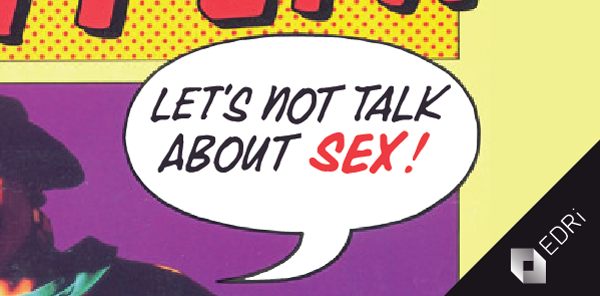We can no longer talk about sex on Facebook in Europe
Sometime in late 2018, Facebook quietly added “Sexual Solicitation” to its list of “Objectionable Content”. Without notifying its users. This is quite remarkable, to put it mildly, as for many people sex is far from being a negligible part of life.

The company writes that it draws a line “when content facilitates, encourages or coordinates sexual contact between adults”. A selection of what isn’t allowed (translated from the Dutch-language Community Standards):
“Content that includes an implicit invitation for sexual intercourse, which can be described as naming a sexual act and other suggestive elements including (but not limited to):
– vague suggestive statements such as: ‘looking forward to an enjoyable evening’
– sexual use of language […]
– content (self-made, digital or existing) that possibly portrays explicit sexual acts or a suggestively positioned person/suggestively positioned persons.
Content in which other acts committed by adults are requested or offered, such as:
– commercial pornography
– partners that share fetishes or sexual interests”
It is unclear what the cause is for this change. The most obvious explanation is new legislation that went into force at the beginning of last year in the United States. The “Fight Online Sex Trafficking Act” and the “Stop Enabling Sex Traffickers Act” (FOSTA/SESTA) hold companies accountable for sex work ads on their platform. Craigslist, among others, took its “Personals” offline and Reddit blocked a couple of sex work-related subreddits. Facebook’s new policy can, as well, be seen as a response to this legislation. The broad formulation of the criteria for what isn’t allowed is a precaution. Facebook chooses to err on the side of caution and over-censor, rather than risk the consequences of hosting illegal content.
Facebook boasts about connecting people, but in reality, the company increasingly frustrates our communication. There’s no question that such vaguely formulated rules combined with automated content filters will lead to more arbitrary censoring. But what this incident illustrates, more than anything, is that Facebook is thwarted by the scale at which it operates, and chooses to offload the cost of scale, namely arbitrary censorship and diminished freedom of expression, onto European users. It’s inconceivable that new legislation passed in the US means that in many European countries, if not all, one consenting adult can no longer ask another consenting adult if they want to have sex. Or, for that matter, get in touch with other people over shared fetishes or fantasies, or exchange information about safe sex.
This impacts all European citizens, and is particularly problematic in the case of people who don’t identify with the traditional, heteronormative perspective of sex and turn to the internet for alternatives. In addition, sex workers are affected disproportionately. Sex workers often use online platforms for contacting clients and in order to exchange tips and information. Proud, an interest group for Dutch sex workers, spoke out against the new legislation in 2018 because it would (further) marginalise sex work. Facebook’s new policy demonstrates that these fears weren’t unfounded.
European countries, like all others, work hard in order to uphold their values. Many of these countries find it important that one can speak openly about sex and sexuality. In the Netherlands, significant efforts are made in order to protect and improve sex workers’ rights. Facebook’s policy thwarts these endeavours. It is unacceptable that we find ourselves in a situation in which legislation from another country has such a big impact on our societies. Is Facebook’s bottom line so important to Europe that we are willing to part with the rights and freedoms we’ve fought so hard to achieve?
In Europe we can no longer talk about sex on Facebook (only in Dutch, 13.12.2018)
https://www.bitsoffreedom.nl/2018/12/13/in-nederland-mag-je-op-facebook-niet-meer-vragen-of-iemand-zin-heeft-in-seks/
(Contribution by Evelyn Austin, EDRi member Bits of Freedom, the Netherlands; translation by Winnie van Nunen)
